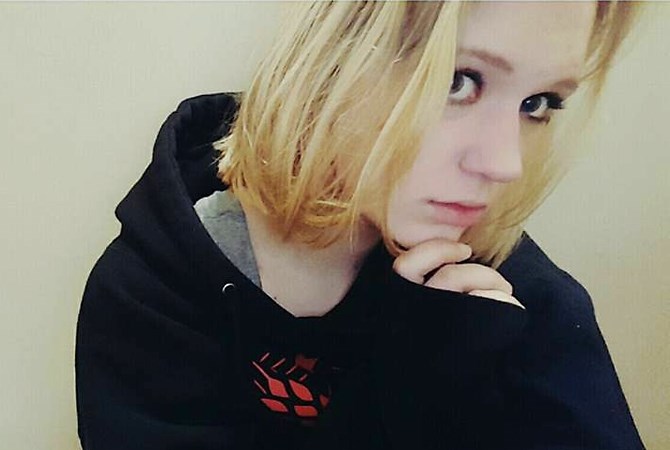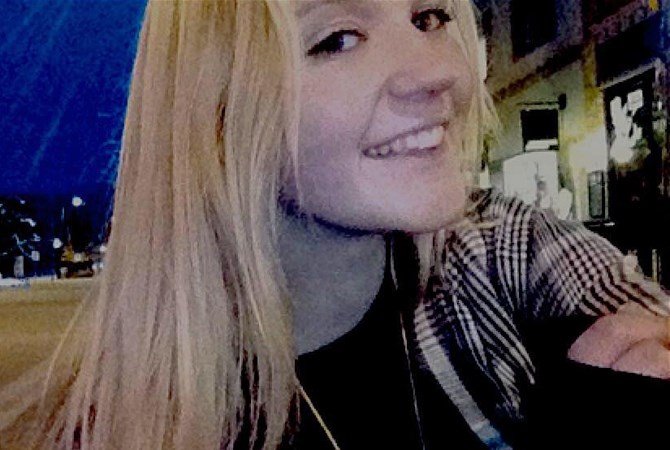
Chelsea Christianson, 17, overdosed and died in a public bathroom the same month she was turned away at a B.C. rehab centre that wasn't even full.
Image Credit: Facebook
March 31, 2017 - 5:11 PM
KELOWNA – There was a time not long ago when Chelsea Christianson had lots of friends, took music lessons and rode horses. Her Facebook memorial page shows photos of a care-free girl goofing around with friends from high school.
Two weeks ago, March 19, 2017, she followed the signs down the long, confusing hallway to the women's washroom at Capri Centre Mall to prepare her next fix of what she expected was heroin. What it really was isn’t known.
She died there in the bathroom, alone. She was 17.
“She was just a really nice kid,” Metro Community Pastor Laurence East says. “She wasn’t a trouble maker. She was a real sweet hearted person but the system let her down.”
Her path to recovery looked a little like that hallway. Several sources say she followed the signs, that the former Mt. Boucherie Secondary school student was on her way. Not long before she died, Chelsea was due to begin treatment at a publicly-funded recovery centre in the Lower Mainland. She was told a bed was waiting and she could begin taking back control of her life as soon as she could get herself there.
When she arrived, however, she found out she did not qualify because the provincially-mandated maximum number of Okanagan residents had already been met, sources say.

Chelsea Christianson, 17, was told she had a bed at a Kelowna treatment centre but found out she did not qualify because of a bureaucratic policy.
Image Credit: Facebook
No one would say which treatment centre Chelsea tried to access or give an official reason why she was denied due to client confidentiality, but those files are often shared between agencies. Multiple sources with knowledge of the file gave the same account of her denial of service. Interior Health is looking into the matter.
“She had a space and went to the recovery centre and was sent back to the streets because of a bureaucratic policy,” a source who wishes to remain anonymous says.
East says this kind of setback is devastating, especially for someone as young as Chelsea.
“It’s hard to adequately describe the sheer magnitude of effort it takes to get into recovery,” East says. “And to get there and be told you can’t get in, when you put so much hope and stock in, there’s a massive impact on you emotionally.”
East says this wasn't the only time Chelsea tried to get into rehab and was on a waitlist for another facility when she died.
“I think there are a lot of social workers who are really upset because it’s not like she just sat there and said ‘screw it I don’t want to get better.’ It wasn’t for a lack of trying. She crossed all the t’s dotted all her i’s. The system failed her.”
Chloe Isabella-Mae Thackray and Chelsea were best friends for seven years but the two started drifting apart a year ago. Chelsea wasn't a stranger to drugs – but when she got into heroin everything changed.
Thackray remembers her as one of the most motivated people she knew, taking voice lessons, acting, horseback riding, guitar and was part of several church groups. She was also a long-time volunteer at the Okanagan Boys and Girls Club.
The heroin changed all that.
“She didn’t care about anything,” she says. “She said she was going out of control. Things were really bad.”
So bad, says another friend, that she did things she wasn't proud of to feed her habit. The friend does not want her name included in the story but says light needs to be shed on Chelsea’s rapid downward spiral.

"Chelsea had a remarkable capacity to be other- focused," Metro Community Pastor Laurence East says. "She was very committed to caring for others."
She died the same month she was told she did not qualify for a spot in a lower mainland rehab facility.
Image Credit: Facebook
Clary Lausnes is a volunteer with All Are Family, a relatively new outreach group consisting of between 20 and 30 volunteers who hand out blankets, food, clothing and advice to Kelowna’s homeless.
“A year ago (Chelsea) was telling her friends not to do drugs because it will kill them,” she says. “It all happened so fast over the last year. We found out (she was on the street) when we were downtown handing out soup.”
Months ago Lausnes and her volunteers were in downtown Kelowna when they saw a blonde girl curled up under a blanket on the sidewalk.
It was Chelsea.
“I’ve worked on the street for the last three years,” Lausnes says. “Three years there were very few, if any, deaths but it slowly escalated from there.”
She says she knows of at least 35 street deaths linked to overdose in Kelowna since the start of 2017.
Pastor East got to know Chelsea well and, like Lausnes and Chelsea’s friends, watched her addiction quickly take over.
“She would come into our centre every day over the last two years,” he says. “We tend to see, especially with youngsters, if things are going wrong at home… often times we begin to see them hang out at the street level. If no one intervenes they usually get worse within six months."
"When you hang around adults more entrenched in their addiction you will be exposed to those things. It’s usually just a matter of time.”
To contact a reporter for this story, email Adam Proskiw or call 250-718-0428 or email the editor. You can also submit photos, videos or news tips to the newsroom and be entered to win a monthly prize draw.
We welcome your comments and opinions on our stories but play nice. We won't censor or delete comments unless they contain off-topic statements or links, unnecessary vulgarity, false facts, spam or obviously fake profiles. If you have any concerns about what you see in comments, email the editor in the link above.
News from © iNFOnews, 2017